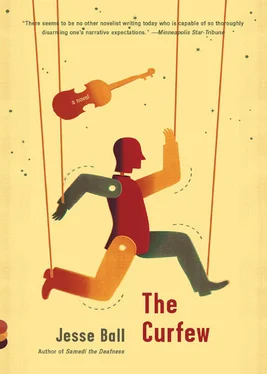
On then to the next appointment. This was a row house where houses were all slate-roofed. Every window in the street had bars across it. At that moment the sky was tremendously blue. For the first time in a long while, William looked down and saw his hands. If you have had this experience, you’ll know just what I mean.
He knocked on the door.
After a minute, he could hear footsteps. The door opened. A man and woman were standing there. They appeared to be husband and wife.
— I’m from the mason.
— Yes, we’ve been expecting you. Won’t you come in?
They brought him through the dark low-slung house to the back, where a long narrow window with many clear square panes afforded some measure of light. It was a room of three chairs.
— This is where we thought we’d talk, said the woman.
— We thought it would be all right in here, added the man.
— That’s fine, said William.
He sat in one of the chairs and took his notebook out. This he set on one knee. From his pocket he took an unsharpened pencil.
Then, out with the knife, and he began his sharpening.
He looked at the couple.
— The stone is for your daughter, I believe?
— Yes.
— She was, nine years old?
— Just nine.
— I’m sorry to hear it.
The couple looked then the one at the other.
William continued,
— You see, I have a daughter who is nine.
The woman flinched as if hit.
— Be careful with her, she said. Our Lisa seemed indestructible, fearless, invincible. But all it takes, all it takes is …
Her voice was drowned out by her own crying. Her husband put his arms around her.
— It was a roof slate that did it. Right here in the street. The wind blew it. She had gone out to play and an hour passed, two hours, three. We just thought she was with a friend, or, well, I don’t know what we thought. Anyway, Joan went out front to see if Lisa was coming, and …
The room was empty except for the three chairs. There weren’t any pictures, there wasn’t a table, just bare walls and this long narrow window of exactly square panes. Each of the panes was square, William observed for the third time. He looked at them in turn, yes, all square, leaded glass.
The man was trying to continue, but it took him a little while.
— You see, she was just there, right in front of the house, on the ground. The rest of her was fine, it was her head that, well, it had sailed down, the slate, and, the wind must have really sent it. I guess it didn’t make any noise as it came.
— I’m sorry, said William. It is a terrible thing.
— We want it to mean something, said the woman. We thought about it, and this is a place where it can be made to mean something, don’t you think?
— I’m sure of it.
— We thought it would begin with the name, that’s how they go, and then,
— So … Lisa Epstein. Did you want the name in capital letters?
— Yes, clear large lettering.
The man broke in,
— Perhaps, perhaps, She was walking in the street by our house, and it was almost evening.
— We thought of it, you know, several different ways. What do you think?
They looked at him then, very intently.
— I think, perhaps, well, let’s look at it. How old, exactly?
— Nine years, twenty-four days.
He leaned over his little book.

Lisa Epstein.
She was walking in the street by our house,
and it was almost evening.

He took a deep breath and leaned back in the chair. He closed his eyes, opened them, looked at it again. He looked up and around the room, avoiding the eyes of the couple. Wherever he tried to look, his eyes were drawn to this narrow ledge of light, this eighteen-paned window. It was the room’s nature, and the three chairs were the expression of that nature. That wasn’t right, though, not exactly. There weren’t three chairs. There were two chairs, and then one that wouldn’t be used. He wondered if he was sitting in the chair that the girl used to sit in. It could even be that the room had changed completely, that the girl had never entered the room under these conditions.
— Do you sit here often?
— We sit here in the evening.
He looked again at his book. Lisa Epstein. Lisa Epstein.
He went to a new page.

LISA EPSTEIN
9 years, 24 days.
In the street by our house, it was almost evening.

He showed it to them.

A thing that develops in a child — that which must occur particularly, precisely, if great success is to be had in some field — is not the prefiguring of that excellence, no! It is not the ability to produce great things of a lesser sort leading upwards like a ladder. It is rather a vague listlessness that infects other matters, leaving the single matter clear.
But then, of course, there is the matter of RIDDLES which must be learned by hand or with great violence of tutelage. Why, I shouldn’t mind being beaten with a stick if it meant I could solve all riddles without exception. Yes, William had been whipped until he had the whole Exeter book by heart. No wonder then, the rise of this second profession, epitaphorist.
There is a theory that the sun is made up of thousands of suns arranged in a war each against the others. It is a discredited theory, but it has never been disproven.

He took an oblique route to the next place, and passed through several alleys, which were themselves connected to other alleys. Here, the backs of things could be seen, unrepaired, unconstructed, unrepentant. Still, one was not unwatched. Faces could be seen beneath ruined stairwells and from the mouths of makeshift tents.
Down the first side-alley he saw a man running, and several men in pursuit. The man who was running ran in an odd way, the way one runs only if one’s hands are tied. Of those who chased him, one had a catch pole with a wire on the end. It ducked towards the first man’s head again and again, but he kept ahead and shot around a corner. The others raced on, relentlessly, and all were gone from sight.
How could the government’s people know one another? The simple answer, and the truth of it, as far as William could tell, is they did not. Government men were often caught by other government men and taken into the huge death cell rumored to be in the city center (no one had ever seen it). Once captured, the truth or falsehood of their claims could be decided. It was a small difficulty that permitted them to go at large without uniforms, operating with impunity.

The next place was a business. It was a butcher’s shop, a huge one. As he entered, he emerged into a place for standing before a long counter, perhaps ninety feet in length. Behind it stood ten or fifteen men dressed in long white aprons. The counter was wood on top with glass, and William had never in his life seen so much meat in one place.
Читать дальше














